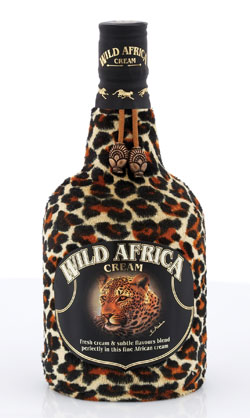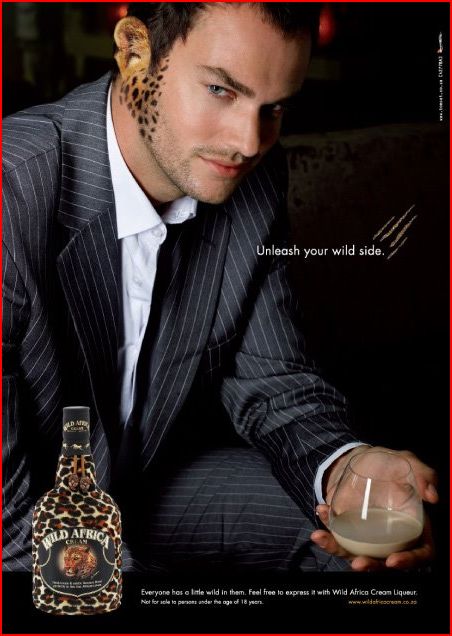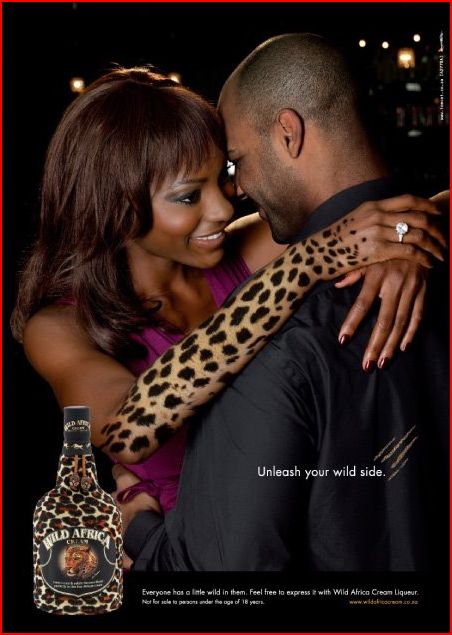AdFreak drew my attention to a South African liqueur called Wild Africa Cream. The advertising suggests that drinking it will “unleash your wild side.”

We have posted before about the tendency to associate black people, especially black women, with animals (see here, here, here, and here), as well as the historical roots of this discourse. But, in this case, the advertising uses both black and white, male and female models.




I think what is interesting here is the association of Africa itself with animalism and primitiveness (an association that no doubt also colors our thinking about black people). (Notice that the first and only Disney film to be set in Africa, The Lion King, included only animals.) Catherine MacKinnon coined the term “anachronistic space” to refer to the idea that different parts of the globe represent different historical periods. See other examples of representing Africa in this way here, here, here, and here.
In line with this tendency to think in this way, in this advertising it’s almost as if black Africans are meant to represent white humans’ own more primitive past (ergo the drink “unleashing your wild side,” whoever you are).
I like to point out to my students that Americans are not more modern than Africans (purposefully eliding the abstract meaning of “modern” in a way that tends to surprise them out of their easy associations). It is 2009 there, also, and human evolution has progress no further from the “wild” in either place.
—————————
Lisa Wade is a professor of sociology at Occidental College. You can follow her on Twitter and Facebook.

Comments 26
Dasha — July 5, 2009
It never fails to upset me when they mention something about the entire African continent as a single thing, as if the multitudes of countries and cultures don't exist there.
Trabb's Boy — July 5, 2009
Your points about social views of Africa as primitive are very interesting, and I hope there will be lots of commentary about that. The ads seem to me to be trying to find a way to market what is essentially Bailey's Irish Cream -- which has come to be seen as a women's drink -- to men. This is done by using a name, bottle and ad campaign that evokes large, fierce, hunting animals. The "Africa" comes largely out of the fact that the product is from South Africa, where I suspect they know that Africa is as modern as anywhere.
Elena — July 5, 2009
Notice that the first and only Disney film to be set in Africa, The Lion King, included only animals
You're forgetting Tarzan.
Alyssa — July 5, 2009
Drink Wild Africa Cream...it will give you a horrible skin disease?
Magnetic Crow — July 5, 2009
Fun anecdote among those lines. I was at a potluck put on by a multicultural club, and happened to meet a fellow there who grew up in Tanzania. We were talking about a Swahili language book he was hoping to write, when a woman who was sitting nearby broke in to ask where Tanzania was.
She then proceeded to ask him if the cuisine at the potluck surprised him, and it eventually came out that she was operating under the assumption that people from Africa "ate mostly bugs". He was pretty congenial about it all, laughing off her questions and trying to use it as an opportunity to educate someone who evidently had never bothered to broaden her own horizons before. Still, it squicked me out quite a bit as an observer.
Bex — July 5, 2009
Ironically, Jaguars (The animal on the bottle) do not live in Africa. They are a wildcat of the Americas (Central and South).
Titanis walleri — July 5, 2009
"I think what is interesting here is the association of Africa itself with animalism and primitiveness (an association that no doubt also colors our thinking about black people). "
It's also associated with *animals*, in large part because Africa (along with southeast Asia) contains most of the world's relatively intact ecosystems. The rest of the world used to look like that, but then we happened to it...
omelet — July 5, 2009
also interesting that everyone is showing us sexy face but the black man, whose face is mostly obscured. what's the deal? like, ladies and pretty white guys: please feel free to unleash your wild side with african cream. ..but black guy? oh no, that's too much. we don't want to encourage that scary behavior.
Pauline — July 5, 2009
I think you're looking at this a little too deeply. We associate africa with animals, yes, because when a lot of us go to Africa it is to see the animals. When we think about Africa it's to dream of the landscape and, unsurprisingly, the animals.
And Africa probably uses this to their advantage, all the tourism ads I see feature the animals.
I live in Australia and everyone seems to associate us with crocodiles and dessert and boxing kangaroos. I don't think that says anything about the people here being violent animals that like sand a lot :S
I think the advertiser has done a beautiful job and think it's a nice advertising campaign. The only thing I'd consider worth pointing out is the connection between alcohol and sex and this drink making people better sex animals. Which could then hint at violent sex as being acceptable.
Surely that is a more important point to make than the loose assumption that associating africa with wild animals is bad.
hi — July 5, 2009
Bex: Jaguars are from the Americas, but Leopards are from Africa (and parts of Asia and the middle east), and not being an expert on the distinctions between different types of spotted big cat... I'd assume that the booze produced in South Africa probably features the feline that lives in Southern Africa rather then the one that lives across the Atlantic.
Magnetic Crow: while I understand the point you are trying to make about how horrifying it is that someone has made it however far into adulthood laboring under the false assumption that people in Africa "ate mostly bugs", your characterization of her as "educate someone who evidently had never bothered to broaden her own horizons before" seems overly judgmental, and seems to rely on the assumption that she had not sought information about what people eat in various parts of Africa because she sees it as a homogenous primitive bloc and is probably therefore racist against black people (based on what we can draw from the post/comments about what happens when people see Africa as homogenous). This isn't a prefect analogy but I made it 20+ years before learning what an artichoke was, or that there was more then one kind of lettuce. Not being much of a foodie the only item I explicitly associate with any indigenous culture anywhere in Africa is Yams (*not counting things I saw on TV, like people eating sheep eyes in Morocco). That my knowledge of foods-of-Africa beings and ends with "Yams are a staple crop of the Igbo in Nigeria" doesn't necessarily imply broader ignorance about other African countries/Africa as a continent, nor does it imply anything about how I perceive Africans.
It strikes me as slightly imperialist that we are assuming that animal motifs in advertising in South Africa have the same type of connotations of primitiveness that they do in America. We have no idea whether or not this product was made by or primarily marketed by whites or blacks, or who it is being primarily marketed to. Based on the variety if images shown the only thing that seems clear is that leopards are associated with sensuality, sexuality and power. Because the women have the spots in both ads it suggests that the drink lowers their inhibitions and allows them to go on the prowl for men.
Kate — July 5, 2009
I find it interesting that the two ads that involve a couple, the woman is the one finding her 'wild side'. Presumably for the benefit of the man.
adam — July 6, 2009
According to the website:
"We cover our bottles in a sleek leopard print material, giving it a wilder attitude than any other bottle on the shelf. But our style has purpose, it's about keeping cool - the content remains cool, even when removed from the fridge. We place ubuntu beads around the neck, because we are proudly South African and hold dear to our heritage...Ubuntu is a cultural way of life in this area, and means that "what is mine is yours and because I am you are." And in the spirit of ubuntu, we've decided to share this smooth taste with the rest of the world"
My guess is that the inclusion of an equal number of white and black, male and female people in the adsis an attempt to be inclusive--trying to express "multicultural," or multiracial, South Africa as the product statement expresses.
However, the idea that this Liqueur should be shares "with the rest of the world after using a threatened African animal who is poached and the aboriginal ubuntu "way of life" once (and continually) threatened by (neo)colonialism (and global capitalism) seems not so distant from commodifying and exporting these African resources for consumption in the North. Is this really sharing, be multicultural, or an appropriation/exploitation of "Africa"in another form?
adam — July 6, 2009
Bex:
Yes we do! Look at the website. Regardles of who is advertising it, it is being marketed around the world to the North and middle and upperclass people. I think this company is not being as exploitative of "Africa" as others--they seem consious to include some cultural context. Yet, the point is that they are **marketing** this product through the association between Africa, animality, wildness, and aboriginal culture. Using the trope of leopards as powerful predatory animals instead of say meercats, they are exploiting widespread colonialist visions of Africa around the world which exist not only in the US but also Japan, Germany and other present or formally imperialist countries and those that continue to consume American pop culture representations of "Africa."
Check out this distorted map that emphasises the Northern distribution (and the USA seems to have 52 states now???):
http://www.wildafricacream.co.za/view/distribution/2.html
For good reading--_Artificial Africas_byu Ruth Mayer (2002):
http://books.google.com/books?id=SdQraQVBeX8C&dq=artifical+africas&source=gbs_navlinks_s
Duran — July 6, 2009
Africa is indeed less modern than the West. Look at any measure of modernity: GDP, industrialization, infant mortality, literacy rates, access to information, etc. Why are you lying to your students?
Morag — July 8, 2009
This ad (at least the bottom image with the woman and man embracing) was ordered to be discontinued in Britain, by the advertising standards agency.(http://www.asa.org.uk/asa/adjudications/ - search for Wild Africa). It wasn't because of racism, but because it was seen to imply that alcohol could make you more confident or enhance your mood, and because it might be implying that alcohol could be used in a seductive or sexual context. The UK is quite hard on gambling and alcohol adds implying you'll be a cooler or sexier person, one complaint is often enough to pull an entire ad campaign.
wondering — July 8, 2009
In every case, the person turning into an animal is a woman, unless there is no woman in the image.
julian — July 14, 2009
Since everyone else is/has covered the issues with this ad campaign/product (of which there are plenty!), I just thought I'd throw out there how fracking COOL some of them look -- particularly the first and second.
The first one makes me think of a tattoo, and I love the idea of a traditionally "pretty," wealthy white woman with a large, visible tattoo.
The second one because it's a surprise -- at first glance it looks like your traditional "hot lady with alcohol -- drink this and you can have me!" liquor ad, and then BAM a tail.
This doesn't make up for the myriad of problems, but still, it is neat.
Black “Lil’ Monkey” Baby Doll » Sociological Images — August 17, 2009
[...] and justify hatred and exploitation. This associations continue to be propagated (e,g., here, here, and here). This week Costco pulled the black “Lil’ Monkey” baby doll from its [...]
V for Vegan: easyVegan.info » Blog Archive » Intersectionality ‘Round the Interwebs, No. 4 — August 19, 2009
[...] Sociological Images: Africa Is Wild, And You Can Be Too [...]
From the Publisher – Costco pulled the Black “Lil’ Monkey” baby doll from its shelves, along with its white “Pretty Panda” « The Political Agitator — September 10, 2009
[...] and justify hatred and exploitation. This associations continue to be propagated (e,g., here, here, and here). This week Costco pulled the black “Lil’ Monkey” baby doll from its shelves, [...]
nightrain — October 12, 2009
"what is interesting here is the association of Africa itself with animalism and primitiveness (an association that no doubt also colors our thinking about black people)"
This is a stupid assumption created by overreacting to anything even slightly hinting at racism. Did the writer of this article not notice the goddamn LEOPARD SPOTS on the people? Not to mention they're not all black? It's the fact that Africa is known for its WILD ANIMALS, not black people, that make it "wild".
Who Is Primitive? » Sociological Images — March 24, 2010
[...] places that are, almost exclusively, in Africa, Latin America, Asia, and the South Pacific. In a previous post I introduced the idea of “anachronistic space.” I wrote: “Catherine MacKinnon [...]
More Fetishization of Black Bodies as Fashion Props (Mildly NSFW) » Sociological Images — May 15, 2010
[...] with a heart of gold, interracial dating as tourism, Indian people as props, Africans as props, and Africa is wild. var addthis_language = 'en'; 17 Comments Tags: clothes/fashion, cultural [...]